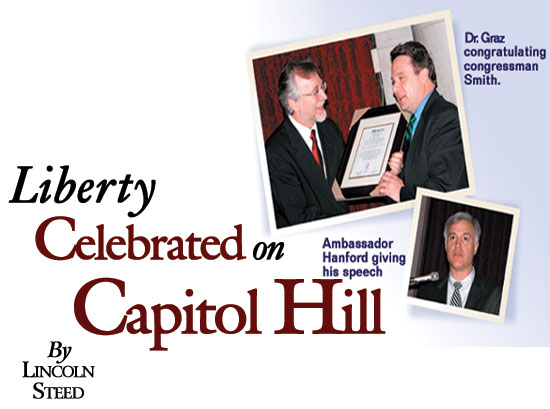Liberty Celebrated on Capitol Hill
Lincoln E. Steed July/August 2003
Getting your Trinity Audio player ready...


The United States Senate caucus room is the sort of marble-floored, wood-paneled location one associates with events of great moment. Indeed, it was from this room that John F. Kennedy announced his candidacy for the presidency; it was in this room that the Watergate and Iran-Contra hearings were conducted; and it was here that staffers gathered for emergency instructions after the anthrax attacks on Senator Tom Daschle's office.
On the evening of April 2, 2003, nearly 200 dignitaries gathered in this historic room to celebrate religious liberty and the role that Liberty magazine plays in protecting it. The invitation event was the first Liberty awards banquet. In organizing the event, Liberty magazine cosponsored with the International Religious Liberty Association and its national chapter, the North American Religious Liberty Association (NARLA). The intent was to underline the importance of religious liberty, to show the role of Liberty magazine, and to honor a number of individuals from around the world and here in North America who have contributed in significant ways to religious liberty. And from this editor's perspective a very exciting subtext to the event was its function as a prelude to our 100th anniversary of the magazine's founding.
Attendees at the event included a number of members of the U.S. Congress, congressional and senate staffers, diplomats from over 30 nations, as varied as Vietnam and New Zealand, a wide group of representatives of nongovernmental organizations with religious liberty involvement, and various religious leaders, including, I am proud to say, a number from the world headquarters of my own Seventh-day Adventist Church.
Emcee for the evening was attorney James Standish, Executive Director of NARLA. He summarized the event well: "The purpose of the dinner is to bring representatives from the U.S. government, the international community, and the private sector together to celebrate the religious freedom enjoyed in the United States, to concentrate on measures necessary to expand religious freedom at home and abroad, and to recognize individuals who have made exceptional contributions to advancing the cause of freedom of conscience."
We were indeed honored to honor people such as Victor P. Krushenitsky, of Russia, for his landmark work there in creating coalitions for religious freedom; U.S. Congressman Christopher Smith for his activist love of religious liberty that was so evident in his acceptance comments; attorney Lee Boothby, who has argued a number of religious liberty cases before the U.S. Supreme Court and who donates so much of his time to international religious liberty work; Canadian attorney Gerald D. Chipeur, who combines political activism and religious liberty expertise in a nationally effective way; and Idaho state senator Grant R. Ipsen, lead sponsor of the Idaho Free Exercise of Religion Act of 2000. Other religious liberty greats honored included Ronald Flowers, Arthur E. Morgan, Daniel C. Robles, Penny Ancel, Lewis Stout, and Robert McCumber. A lifetime recognition award went to Dr. Adrian Westney, who still amazes with his religious liberty involvement, including a regular radio program heard by many in the Washington, D.C., area.
During the banquet itself we listened to an address by John Hanford, United States ambassador-at-large for international religious freedom. He spoke of the challenges we face around the globe, with most countries acknowledging the need for religious freedom, but so many applying the principles in restrictive ways. But he showed reason for optimism. And surely this event in itself, with so many diplomats present—and many of them from countries still grappling with how to implement religious freedom in effective ways—argues for optimism.
Early on in the program I shared with the distinguished guests a short "documentary" video we had prepared for mostly church-oriented sponsors of the magazine. I think they were impressed at the credentials of a magazine that was begun by a church shaped by the challenges of communicating faith in spite of legislative and societal difficulties; a magazine that has always stood for religious liberty for all; a magazine that is read by nearly 200,000 people each issue—a reading audience made up primarily of elected leaders, judiciary, lawyers, community leaders, and professionals. They know the value of religious freedom. And when the attendees saw the cameo by President George W. Bush on the video, and heard him acknowledge and recommit to religious freedom, they understood so well the reason for our coming together.

Article Author: Lincoln E. Steed
Lincoln E. Steed is the editor of Liberty magazine, a 200,000 circulation religious liberty journal which is distributed to political leaders, judiciary, lawyers and other thought leaders in North America. He is additionally the host of the weekly 3ABN television show "The Liberty Insider," and the radio program "Lifequest Liberty."